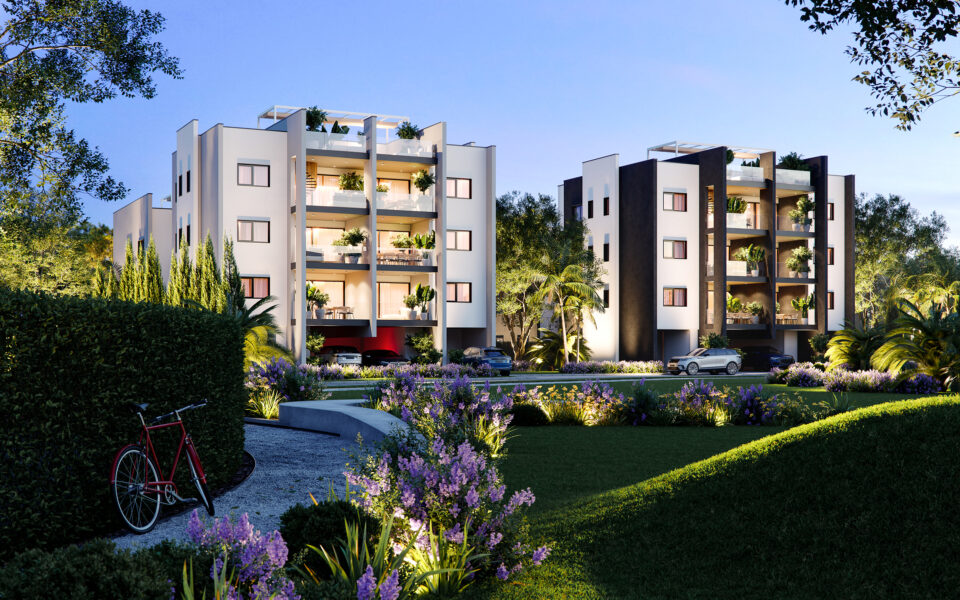11.10.2021
Contents
Companies that do not accept the concept of sustainable development will find themselves in a difficult position.
The planet is sounding the alarm, and now more than ever, universal action is needed to protect the environment. Unprecedented changes in the global climate system, rising temperatures, global warming, and an increase in the frequency and intensity of extreme weather prove that climate change is much closer than we thought. International organizations and governments stress the need for immediate and effective action.
Real estate design
The real estate sector accounts for 40 percent of global greenhouse gas emissions. That is why the housing market has a key role to play in trying to turn the tide. The real estate industry can do its part by creating buildings that have the lowest possible environmental impact during the construction phase and are powered by green energy. Modern design can make a significant difference by reducing the lighting, heating and cooling needs of buildings. Combined with the use of alternative energy sources, real estate can achieve zero energy balance. At the same time, planting trees and greening rooftops can improve the biodiversity of local habitats and mitigate the effects of extreme weather while improving the quality of life for residents.
There’s still a long way to go
Significant steps have been taken in the Cyprus property market in recent years.Progress is mainly in the area of energy efficiency in buildings and the installation of modern HVAC equipment. The use of efficient lighting (LEDs) also played an important role. Another important aspect is the widespread use of photovoltaic systems, as well as the energy retrofitting of a large number of existing buildings.
However, there is still a long way to go before becoming a sustainable market. Companies that do not include the concept of sustainable development directly in their philosophy and new projects will face serious risks in the near future.
Millennials choose sustainability
Governments continue to implement stricter standards. It is likely that developers will be forced, either during the construction phase or later, to carry out costly interventions to ensure that their developments meet the minimum required standards. Millennials are the most important regulators of market demand these days. They are highly sensitive to the environment and put sustainability, energy efficiency and quality of life at the forefront of their purchasing decisions. At the same time, the demand for green business spaces is growing. It should be taken seriously that more and more millennials are looking to work for companies with social and environmental responsibility.Another risk that companies that do not adhere to green policies will face is the possibility that they will not be able to obtain financing or profitable bank loans. The ECB is already increasing its requirements for financial institutions to properly price climate risks. Several banks have begun lending to green projects at more competitive interest rates.
Imperio as a model of green growth
Imperio was aware of the dangers of non-compliance with environmental policies in development and wanted to do their part in protecting the environment. The most suitable methods were introduced, as well as several technological innovations, so that the activity leaves the lowest possible environmental impact. A typical example is the gated community Sunset Gardens. It will fully meet its energy needs from renewable sources, and will also have photovoltaic systems, a purification system and the use of water to supply green spaces. In addition, a waste management system will be used and 40,000 trees and plants will be planted.
National strategy is key
However, to realize the vision of the overall transition of the sector into the modern era of high environmental responsibility, it is not enough to change course on the part of entrepreneurs involved in real estate development. In this regard, it seems necessary to strengthen the national strategy and take additional measures by the competent authorities. Among other things, measures can be taken that include energy and bioclimatic modernization of public buildings. It is also necessary to continue and expand incentives for the energy modernization of private buildings and residential buildings, incentives for the use of renewable energy sources, as well as tightening the minimum energy standards of buildings.
The use of environmentally friendly materials as well as alternative methods during the construction phase can also be strengthened by public policy. In France, the government has made it essential that publicly funded buildings be built with at least 50% wood or other sustainable materials.
In conclusion, it should be made clear that adapting to new data and helping to reverse the negative impacts of climate change is not a matter of choice. On the contrary, it is a one-way street for industry professionals. What is required of entrepreneurs in the industry is to make the right decisions, understand the risks associated with unsustainable projects, and adapt to new market needs. Only in this way will they ensure the viability of their projects and the profitability of organizations, while helping the national economy and the environment.
















